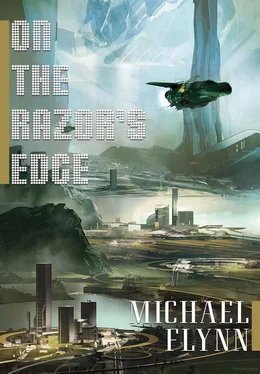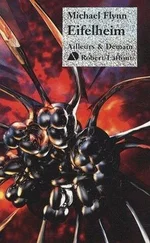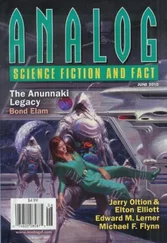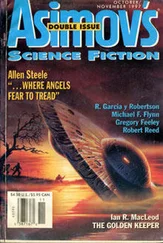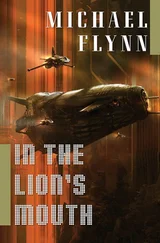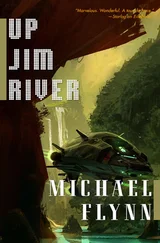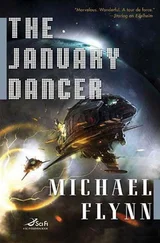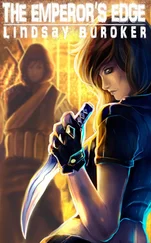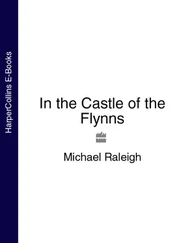He spied the moose near the opening at the farther end of the meadow and crept closer, going to his belly and wriggling behind a deadfall of trees. He tested the wind (he was downwind) and raised himself up to the edge of the fallen trunk and painted the moose with his spot rifle and—
* * *
—and he peers above the parapet of a ruined building, his hands choking his spot rifle. Stone lion heads gape from the cornices beside him. Bolt tanks flank the triton fountain in the rubble-littered plaza below. Bullets sing off the plasteel and he ducks back down. The assault has failed. The Protector’s flag still flies over Coronation House.
He rolls to another position, estimates where the closest tank must be, then pops up and “paints” the tank with his spot rifle and ducks back down before the chatterguns walk in on him. He waits, but nothing happens.
“The Protectors must have sanded the satellite,” he says. “Our submunitions didn’t lock on to the painter!”
There is no answer. He looks around. The parapet is empty save for the dead.
The sky turns white and the building shudders. He feels a tingling even through the insulation of his shenmat. The bolt tank has fired. It will be several minutes while it recharges. But of course there are four tanks, one at each intersection, and they will take turns. Across the plaza the Chancellery flashes and the walls fall in upon themselves as the building comes down. Another post lost. How much longer can he hold the Education Ministry?
A young woman touches him on the shoulder. She is young, hardly more than a girl, unarmored, uninsulated, barefoot amidst the broken glass and masonry that litter the rooftop. She wears a Doric chiton and seems too delicate even to live on this world, let alone in the hell it has become.
There is a way out of this, she tells him, and her voice is like a melody.
* * *
Donovan rolled back panting behind the fallen tree trunk.
A memory, said the Sleuth. But when and where?
“And whose?” the Fudir added.
“Pollyanna?” Donovan said. “You were there, on the rooftop. What was that?”
I don’t know, the girl in the chiton answered. It was muscle memory. It was the heft of the rifle, the motions of our body, that evoked it. Ask the Brute.
But the Brute only shrugged.
“A genuine memory?” Donovan proposed. “Or a false one, implanted by suggestion after all those interrogations, the recordings played while we slept?”
When the people around you continually tell you things about yourself, you eventually begin to “remember” them.
And thank you for that tidbit, Pedant. I think the memory was real. We were in the Secret City during Padaborn’s Rising.
“But false memory or real,” demanded the Fudir, “which of us had it?”
Who cares?said the Brute, and he whipped his spot rifle over the deadfall, ran his sights up the middle of the foreleg, and painted the moose just about one-third of the way into the body. The anatomist watching remotely through the sights ruled both shoulders broken, with a high probability that the heart had been pierced as well. The moose would have buckled and fallen.
“Good shot, sir,” Pyati told Donovan over the link. “Those beasts like to go die in hard places. Always best to drop them where they stand.”
Donovan reflected that that was good advice for more than moose.
* * *
He and Gidula painted five “kills” between them that day, according to the anatomist and the armorer. Gidula announced the sixth a kill-in-fact and brought down what he called a lazarus elk, bearing an enormous spread of antlers. Apparently, the creature had once been extinct and the science-wallahs of the Old Commonwealth had somehow rebooted it. The beast wanted three high-velocity rounds to topple, and Gidula erected a cairn on the spot and burned thereon the offal as an offering to Jana Wogawi, the Goddess of the Hunt. The remainder of the carcass they field-dressed and sent back to the Forks by airtruck, to be butchered and sold at the twelveday market. The head and rack Gidula kept, as a trophy for the Gun Room.
* * *
Betweentimes, Donovan endured multiple interrogations with Gidula. The Old One tried all the same tactics that Oschous had tried, and with all the same results. Yet he must have known those methods had proven futile. So why the Kabuki?
He can’t simply pith us, the Sleuth said. If the memories are truly inaccessible, he will not find them by drilling. And afterward, all hope of obtaining them would be lost.
Beside which, the young man in the chlamys said, you’ve made too many friends. Oschous—and by now Dawshoo—knows Gidula has you, and he’s not ready for an open break with the other two triumvirs. Some of his own people might now turn against him if he pressed kaowèn on “the great Geshler Padaborn.” I could name the magpies that would flock to your side in such a division.
But there were others who hated the Names deeply enough that they would tolerate any means, including kaowèn, to obtain the key to the Secret City. This struck Donovan as odd, even ironic. What was the point of revolution if matters did not revolve and men just as cruel seized the reins?
The question arose obliquely one afternoon when he and Pyati had been sparring in the pleshra . “I don’t mind at the helm a strong arm,” the magpie said while they showered off the grime of combat, “or in the saddle a keen pilot. But when authoritarianism is with decadence tainted, our liberties fade.”
“Can there be liberties under authoritarianism,” said Donovan, “however undecadent they might be?”
Pyati paused while soaping up. “Of course. When the leash is slackly held, and tugged only now and then and for good cause.”
“I’m inclined,” the Fudir replied, “to regard the existence of the leash as sufficient irritant.”
The other nodded, considering the words. “You saw in the League the anarchy that follows when there are no leashes. The Old One names two oppressions of sheep. The first, when power is arbitrary; the second, when there is no power at all. When no man holds the leash, all men hold leashes, and tyranny is petty and irksome and everywhere. Instead of the great laws, we have the niggling nettles of many small laws. The leash is always there, master. What matters is who holds it.”
Donovan rinsed off, ducking his head under the cascade. “Then why,” he said when he emerged, “have you joined the Revolution?”
Pyati seemed surprised by the question. “Why? Because my master has told me. Because wise managers have become petty tyrants. Because they push and prod, but do not lead. Because they have trampled our traditions and have dropped the leash. Revolution is coming, whether we Shadows lead it or not. Better us than chaos.”
Donovan studied his own naked body in the mirror, considered how frail he seemed. He did not attempt to count the scars, for chaos seemed embodied in their very number and placement. One day, he knew, there would be no autoclinic handy to knit them up afterward.
* * *
A Shadow was expected to use his mind as well as his hands, feet, and happenstance bric-a-brac. And so the scarred man’s exercises were more than merely physical. There were simulations, puzzles, scenarios, war games—in which the race went not to the fleet, but to deceit.
And so he had learned—or relearned—a number of plays. Some he had never forgotten. He had used The Little Birdie in the Terran Corner on Jehovah, igniting a rumor-storm with a series of well-placed and well-timed whispers that had culminated in the dismissal of the Jehovan Inspector of the Starport market. Other plays had the quality of the newly remembered. When he finally made his move, he chose The Missing Man, which required the cooperation of several collaborators and the subversion of the compound’s information system.
Читать дальше
